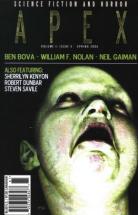“Starfish” by Steve Parker
“Away” by Robert Dunbar
“EV 2000” by Amy Grech
“Wall of Delusion” by Jerry J. Davis
“Scotch on the Rocks” by William F. Nolan
“Sacrifices” by Rhonda Eudaly
“Temple: Junkyard Dogs” by Steve Savile
In “Starfish,” Steve Parker offers an interesting mixture of redemption story and morality play. The story is set in a multicultural Japan in a future when fishing has been outlawed after an aquatic species, the Sylurians, immigrated to Earth’s oceans. Petr, a Russian expatriate, has managed to acquire a Sylurian infant to sell to one of the private clubs which flout the ban. Petr is an unappealing protagonist, willing to sell his girlfriend into prostitution and sell out his cousin, Yvgeny, in order to achieve his ambition of leaving Tokyo and moving to California, presented as the promised land of milk and honey. As the story progresses, Petr begins to feel some remorse for his activities. Parker, however, is not content to make “Starfish” simply a tale of Petr’s salvation, but also insists on a moral, which adds an interesting twist at the end, even if it is a bit heavy handed.
Robert Dunbar presents a paranoid delusion in “Away.” While this type of science fiction/horror story generally results in the discovery that the paranoid fantasies are real, in “Away,” Dunbar maintains a level of ambiguity which simultaneously distances the reader from the first person narrator and presents the questions of the reality of the story, resulting in an unreliable narrator used to drive the tale.
“EV 2000” by Amy Grech is a tale of an inventor running the final tests on a new method for blood donation extraction and storage. While Grech’s idea for the EV 2000, the machine which extracts blood, is interesting, she fails in this short story by tacking a cliché onto her initial idea. This fault is compounded by creating an unrealistic relationship between Harold Roberts, the inventor, and his wife, June. Finally, the methodology of Roberts’s tests indicate Grech has no familiarity with the way modern labs work. In some ways, “EV 2000” is a throwback to the magnificent inventor stories of the 1930s, and, in fact, the story works best on those terms, although even then it doesn’t work as smoothly as it could and requires a massive dose of suspension of disbelief.
Jerry J. Davis plays with the idea of brain and memory modification in “Wall of Delusion.” His protagonist, Scott Hague, is in prison for killing his wife in a fit of passion. It becomes clear early in the story where it is going to go, although Davis does manage to include a couple of twists to avoid complete predictability. This twist goes a long way towards saving the story, but isn’t quite enough to make it entirely memorable.
William F. Nolan provides another reasonably predictable story, “Scotch on the Rocks,” a story of aliens in a small town. Set up as a bar story, a visitor is told by the barman about the UFOs which have been seen in the town and their effects. The bartender’s story is not only met with skepticism, but also with the ramblings of a drunk who claims he is from Venus. The story is an entertaining look at the UFO phenomenon, although it fails to attempt to answer any questions, instead presenting itself as a tale in the vein of O. Henry.
The issue ends with Rhonda Eudaly’s short cautionary tale of matching wits with a computer. Clearly an homage to Arthur C. Clarke’s 2001, “Sacrifices” features Loki, a computer which has read Clarke’s novel and enjoys making references to it to its human operator, Connor Reese. Although a reasonably cliché set up with an extremely clichéd final line, the story works better than it should, partly because Eudaly doesn’t attempt to stretch the story beyond its natural length.
In addition, this issue of Apex includes the first part of a four part serial by Steve Savile, “Temple: Junkyard Dogs,” and a reprint of Ben Bova’s “Inspiration.”
